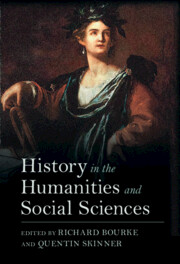Book contents
- History in the Humanities and Social Sciences
- History in the Humanities and Social Sciences
- Copyright page
- Contents
- Figures
- Contributors
- Acknowledgements
- Introduction
- 1 Law and History, History and Law
- 2 History, Law and the Rediscovery of Social Theory
- 3 The Uses of History in the Study of International Politics
- 4 International Relations Theory and Modern International Order: The Case of Refugees
- 5 The Delphi Syndrome: Using History in the Social Sciences
- 6 Power in Narrative and Narratives of Power in Historical Sociology
- 7 History and Normativity in Political Theory: The Case of Rawls
- 8 Political Philosophy and the Uses of History
- 9 The Relationship between Philosophy and its History
- 10 When Reason Does Not See You: Feminism at the Intersection of History and Philosophy
- 11 On (Lost and Found) Analytical History in Political Science
- 12 Making History: Poetry and Prosopopoeia
- 13 Reloading the British Romantic Canon: The Historical Editing of Literary Texts
- 14 Economics and History: Analysing Serfdom
- 15 The Return of Depression Economics: Paul Krugman and the Twenty-First-Century Crisis of American Democracy
- 16 Anthropology and the Turn to History
- Index
- References
3 - The Uses of History in the Study of International Politics
Published online by Cambridge University Press: 08 December 2022
- History in the Humanities and Social Sciences
- History in the Humanities and Social Sciences
- Copyright page
- Contents
- Figures
- Contributors
- Acknowledgements
- Introduction
- 1 Law and History, History and Law
- 2 History, Law and the Rediscovery of Social Theory
- 3 The Uses of History in the Study of International Politics
- 4 International Relations Theory and Modern International Order: The Case of Refugees
- 5 The Delphi Syndrome: Using History in the Social Sciences
- 6 Power in Narrative and Narratives of Power in Historical Sociology
- 7 History and Normativity in Political Theory: The Case of Rawls
- 8 Political Philosophy and the Uses of History
- 9 The Relationship between Philosophy and its History
- 10 When Reason Does Not See You: Feminism at the Intersection of History and Philosophy
- 11 On (Lost and Found) Analytical History in Political Science
- 12 Making History: Poetry and Prosopopoeia
- 13 Reloading the British Romantic Canon: The Historical Editing of Literary Texts
- 14 Economics and History: Analysing Serfdom
- 15 The Return of Depression Economics: Paul Krugman and the Twenty-First-Century Crisis of American Democracy
- 16 Anthropology and the Turn to History
- Index
- References
Summary
This chapter argues that the study of international politics in the fields of International Relations and International Law was long hampered by these fields’ neglect of historical research and reliance on schematic historical narratives featuring the rise and expansion of the European nation-state system. Beginning around the turn of the twenty-first century both fields have been reanimated by historical scholarship, much of which has attended to the modern history of empires and to patterned and persistent hierarchies. The chapter examines the longer lineage of this recent work, in earlier historical accounts that traced the emergence in the modern world of a hierarchical global order. These include W.E.B Du Bois’s account of the global color line as the product of a modern racial capitalism with roots in slavery and imperial commerce that had taken a distinctive democratic form in the late nineteenth century; and the first generation of “third world approaches to international law” written in the 1950s and 60s during decolonization. The chapter argues for historical work that resists IR’s misleading inclination to conceive of states (implicitly nation-states) as the chief or sole agents of international politics and legal scholarship’s tendency to obscure the role played by international law itself in the enforcement of coercive hierarchies.
Keywords
- Type
- Chapter
- Information
- History in the Humanities and Social Sciences , pp. 69 - 89Publisher: Cambridge University PressPrint publication year: 2022

